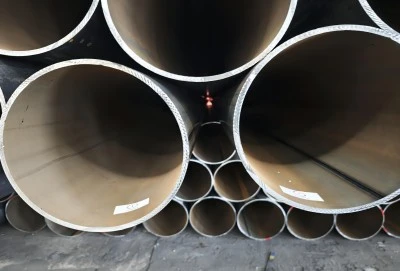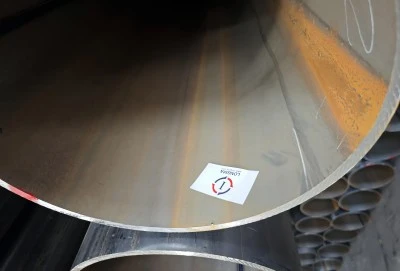The longevity and reliability of API 5L ERW (Electric Resistance Welded) pipes depend significantly on proper maintenance practices and understanding their life cycle characteristics. These critical components of oil and gas infrastructure require careful attention to ensure safe and efficient operation throughout their service life. The combination of appropriate material selection, manufacturing quality, maintenance procedures, and life prediction methods determines the overall performance and durability of pipeline systems. This comprehensive examination explores the essential aspects of API 5L ERW pipe maintenance and life cycle management, providing valuable insights for operators and maintenance professionals in the oil and gas industry.
|
|
|
Material And Manufacturing Standards
API 5L represents a comprehensive standard developed by the American Petroleum Institute that establishes rigorous requirements for line pipe manufacturing. The specification encompasses material selection, manufacturing processes, testing requirements, and quality control measures essential for producing reliable pipeline components. The electric resistance welding process employed in ERW pipe production requires precise control of welding parameters to ensure consistent joint quality. The standard defines two product specification levels: PSL1 and PSL2.
PSL2 implements additional requirements and stricter controls on chemical composition, mechanical properties, and testing procedures. This enhanced specification level provides greater assurance of pipe performance in demanding applications. The manufacturing process must maintain strict control over essential variables, including steel chemistry, forming operations, and heat treatment parameters.
Modern manufacturing facilities utilize advanced process control systems to monitor and adjust critical parameters during production. These systems help maintain consistent product quality while providing documentation for traceability and quality assurance purposes. The welding process receives particular attention, with continuous monitoring of welding current, voltage, and speed to ensure proper fusion and joint integrity.
Quality control measures include regular testing of mechanical properties, dimensional characteristics, and non-destructive examination of welds. These tests validate compliance with API 5L requirements while providing data for ongoing process improvement initiatives. The manufacturing standard emphasizes the importance of proper material handling and storage procedures to prevent damage during production and preparation for shipment.
Maintenance Methods
The implementation of comprehensive maintenance strategies proves essential for maximizing the service life of API 5L ERW pipes. Surface protection systems play a crucial role in preventing corrosion and extending pipeline longevity. Various coating options, including fusion-bonded epoxy (FBE), three-layer polyethylene, and specialized composite systems, provide protection against environmental factors and corrosive media.
Galvanization offers an additional protection method, particularly for above-ground applications where atmospheric corrosion presents concerns. The zinc coating provides both barrier and sacrificial protection, helping prevent base metal deterioration.
Surface preparation quality significantly influences coating performance, requiring careful attention during application processes. End protection systems prevent damage during handling, storage, and transportation operations. Protective caps, thread protectors, and specialized packaging materials shield critical surfaces from mechanical damage and environmental exposure. These protection measures help maintain pipe integrity from manufacturing through installation.
Regular inspection programs form the cornerstone of effective maintenance strategies. Modern inspection techniques include intelligent pigging, ultrasonic testing, and electromagnetic methods for detecting potential defects or deterioration. Data from these inspections enables operators to assess pipeline condition and plan maintenance activities effectively. Environmental considerations influence maintenance program design and implementation. Soil conditions, atmospheric exposure, and operational parameters affect deterioration mechanisms and maintenance requirements.
Safety protocols ensure maintenance activities comply with regulatory requirements while protecting personnel and the environment. Cathodic protection systems complement coating protection for buried pipelines. Regular monitoring and adjustment of these systems ensure continued effectiveness in preventing external corrosion. The integration of multiple protection methods provides redundancy and enhances overall system reliability.
Life Prediction
Life prediction methodologies for API 5L ERW pipes incorporate advanced analytical techniques and empirical data to assess remaining service life. The evaluation of crack-like defects requires sophisticated fracture mechanics approaches, considering both static and cyclic loading conditions.
Modern assessment methods utilize probabilistic techniques to account for uncertainties in loading conditions and material properties. Fitness-for-service assessments help operators determine the significance of discovered defects and establish appropriate response strategies. These assessments consider multiple factors, including defect geometry, loading conditions, and material properties.
Industry standards provide acceptance criteria and assessment procedures for various types of pipeline damage. Remaining life calculations incorporate growth rate predictions for identified defects, enabling operators to optimize inspection intervals and maintenance planning. These predictions consider environmental factors, operational conditions, and historical performance data.
Advanced modeling techniques help validate life predictions and evaluate the effectiveness of proposed mitigation measures. Risk-based inspection planning utilizes life prediction results to focus resources on critical areas while maintaining overall system reliability. This approach optimizes inspection schedules based on consequence and likelihood of failure considerations. Regular updates to risk assessments ensure maintenance strategies remain aligned with current pipeline conditions. The development of maintenance and inspection plans considers predicted remaining life alongside operational requirements and regulatory obligations. These plans incorporate contingency measures for addressing unexpected deterioration or damage discovered during inspections. The integration of life prediction results with maintenance planning helps optimize resource allocation while maintaining system integrity.
API 5L ERW Pipe For Sale
LONGMA GROUP has established comprehensive capabilities in manufacturing API 5L ERW pipes meeting both PSL1 and PSL2 requirements. Their manufacturing processes incorporate modern equipment and control systems to ensure consistent product quality. Quality management systems maintain strict control over critical parameters affecting product performance and longevity. The production facilities utilize advanced testing and inspection equipment to verify compliance with API 5L requirements.
Regular calibration and maintenance of testing equipment ensures accurate and reliable results. Documentation systems provide complete traceability of materials and manufacturing parameters throughout the production process. Quality control programs encompass material testing, dimensional verification, and non-destructive examination of welds. These programs validate product quality while providing data for continuous improvement initiatives. Technical support personnel assist customers with material selection and specification development to ensure optimal performance in specific applications.
Customers interested in sourcing API 5L ERW pipes can contact LONGMA GROUP through info@longma-group.com. The technical team provides comprehensive support throughout the procurement process, including specification review and documentation requirements. The company maintains extensive inventory levels to meet customer delivery requirements while ensuring product quality and traceability.
LONGMA GROUP's commitment to quality extends beyond basic manufacturing requirements to include enhanced testing and inspection capabilities. Their focus on customer service includes detailed technical support and documentation to facilitate maintenance planning and life cycle management. The integration of quality management systems with production processes helps ensure consistent product performance and reliability.














